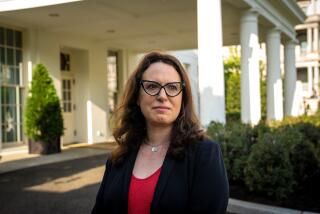Harriman and Gossip Elevated to Statesmanship
- Share via
Reading Don Cook’s article (Opinion, Aug. 3) reminded me that I, too, was fortunate enough to savor several samples from Averell Harriman’s “vast repository of unpublished tales, gossip elevated to statesmanship because it involved firsthand encounters with national leaders.”
For me the most memorable bit of “gossip elevated to statesmanship” occurred in 1978, during the United Nations Special Session on Disarmament. Because we were driving to a Soviet reception for American delegates, it seemed perfectly natural for Governor Harriman (as he always preferred to be addressed) to reminisce about some of his many encounters with various Soviet leaders. In that vein he recalled and recounted a discussion in Moscow with Leonid Brezhnev. Because they were talking about personal matters at the time, Harriman was not surprised when Brezhnev took out his wallet and--beaming with pride--handed over several photographs of his recently born first great-grandchild. While studying them Harriman happened to glance up and notice that the eyes of his host were filled with tears.
Expressing astonishment, Harriman reminded Brezhnev that joy and pride were the appropriate emotions for a person fortunate enough to become a great-grandfather. Why, therefore, the tears? The reply came in words he would always remember, said the remarkable raconteur (as Don Cook correctly describes Harriman). The tears were caused, Brezhnev told him, “by thinking of this child in the context of the stupid policies in which my government and yours seem to be trapped, and a nuclear arms race that has taken on a life of its own--a life that practically guarantees no chance for this child to live out its life.”
To have known Averell Harriman was to know that he was anything but a soft-hearted sentimentalist. Neither, the great raconteur continued that evening in New York, was Leonid Brezhnev, with whom he had developed a rather close personal relationship over a period of years. Nevertheless, in that magic moment of their Moscow meeting, their mutual focus upon the life to be of a newly born human being forced upon both men a political perspective far too rarely glimpsed by national leaders, Averell Harriman concluded.
To have known the public record of this remarkable public servant was to know that in his role of negotiator he was as tough and shrewd as anyone could be when dealing with the Soviet Union. Anyone, that is, who wants to come out with a mutually advantageous deal rather than with a public perception that camouflages what was actually a negotiating charade. Harriman, in other words, was a hard-headed pragmatic patriot who understood that thermonuclear technology had transformed two nations into Global Siamese Twins destined to live--or to die--together. Neither the Soviets nor we can ever again enjoy national security, I have heard him say on numerous occasions, at the expense of the other side. It’s “co-security” or “no-security,” he would often remark. And he would sometimes add: We are adversaries destined to compete in economic and political arenas, but the only enemy is our common enemy, whose name is nuclear war.
Even in the ninth decade of his life Averell Harriman proved to be free from the political atherosclerosis--a hardening of the attitudes--which seems to afflict so many self-righteous dogmatists. Unlike them, Harriman believed that our national self-interest would be well served by working with the Soviets to preserve the human species, and unlike them, he agreed with George Washington who, in his Farewell Address warned that “The nation which indulges toward another an habitual hatred . . . is a slave to its animosity.”
HAROLD WILLENS
Los Angeles

